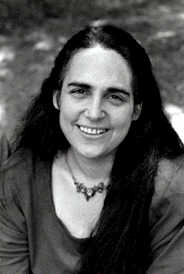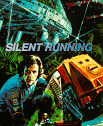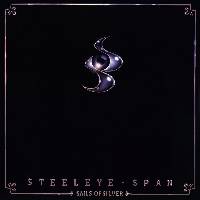Hour of the Wolf is a two-hour live radio program presenting science fiction, fantasy, and related fields of endeavor. Each program promises either a reading, (preferably by the author, but more often than not by host/producer Jim Freund) or else a radio drama. Many such dramas come from the archives of Max Schmid, whose Golden Age of Radio has become one of WBAI's most popular programs. Some are from the WBAI archives, with such notable producers and participants as Baird Searles, Samuel R. Delany, and Joanna Russ. Live interviews with sf writers are a mainstay of the program. We also record and broadcast The New York Review of Science Fiction Reading series . Time permitting, we indulge listener phone calls. While the show concentrates on literary sf, we do have an occasional "Guilty Pleasures" episode regarding film and television.
The show generally starts out with anywhere from 15 minutes to half-an-hour of music, with an accent on Celtic rock (particularly Steeleye Span,) and early jazz.
![]()
A Brief History![]()
Hour of the Wolf began on WBAI in 1972 as a free-form live radio program. Created by  Margot Adler, (now of National Public Radio, and author of Drawing Down the Moon and Heretic's Heart,) the program originally ran Monday thru Friday from 5 - 7 AM. Thursdays and Fridays were designated as a 'Science Fiction Spectacular', and I was the co-host on those mornings. Margot Adler has chronicled these beginnings in her book, Heretic's Heart. Click here to read this portion of her book.
Margot Adler, (now of National Public Radio, and author of Drawing Down the Moon and Heretic's Heart,) the program originally ran Monday thru Friday from 5 - 7 AM. Thursdays and Fridays were designated as a 'Science Fiction Spectacular', and I was the co-host on those mornings. Margot Adler has chronicled these beginnings in her book, Heretic's Heart. Click here to read this portion of her book.
After about two years, Margot went to the Clarion Science Fiction Writers Workshop (West), and I took over the program. Upon her return, Margot began Unstuck in Time, and I've had the show since.
A few years later, (perhaps 1975,) I gave up Monday thru Wednesday mornings, and maintained Thursday and Friday. That was chopped down by a program director to Thursdays, and subsequently moved Fridays in about 1979. Circa 1983, program director Stephen Erickson made wholesale changes to WBAI's schedule, and moved Hour of the Wolf to Saturday mornings, thereby truncating Simon Loekle's brilliant program, Why the Revolution Hasn't Come. (Simon's current show, As I Please, continues to follow mine from 7 - 8:30 AM.) I went initially kicking and screaming, since weekday mornings from 6 to 7 are considered Drive Time, but soon learned that for reasons I'm still not aware of, Saturdays are also subject to morning Drive Time, and I've lost nothing in the ratings (such as they are:-).
 Margot Adler took the name Hour of the Wolf from the 1968 Ingmar Bergman movie, Vargtimmen. In the film it is explained that the ancient Romans used the term to refer to the morning twilight--a time they believed the majority of people were born and died, when dreams were effective, and that magic reached its greatest potency. (Of course, you can purchase it at Amazon.com.)
Margot Adler took the name Hour of the Wolf from the 1968 Ingmar Bergman movie, Vargtimmen. In the film it is explained that the ancient Romans used the term to refer to the morning twilight--a time they believed the majority of people were born and died, when dreams were effective, and that magic reached its greatest potency. (Of course, you can purchase it at Amazon.com.)
There are references to Hour of the Wolf in several media. Probably the best known is within the Firesign Theatre's classic audio drama/comedy, Don't Crush That Dwarf, Hand Me The Pliers. There are a couple of pot-boilers and record albums with that name, but it has no real significance within.
The same may be said for an episode called "The Hour of the Wolf" on Babylon 5, where Ivanova, (the Claudia Christian character,) gives a very different explanation of the phrase's meaning than is usually accepted. I had thought that this reference may have been an homage to my radio program, since the producer/writer, J. Michael Straczynski, used to host the radio program Hour 25, which was sort of spun off from mine by the late Mike Hodel. However, when I ran into Straczynski at a sf convention, he disclaimed any connection or knowledge of my show. (Funny thing--they used to play my tapes and vice versa.)
There is a poem entitled Jamaica by Jim Morrison that appears much more relevant, that begins:
The hour of the wolf
has now ended. Cocks
crow. The world is built
up again, struggling in
darkness.
The child gives in to night-
Mare, while the grown
Man fears his fear.
 The opening music comes from the soundtrack of the motion picture, Silent Running, and is composed by Peter Schickele. The cut is entitled "The Space Fleet". In the film itself, the composition is somewhat different, and is broken up. The record gives a much better sense of Schickele's composition. This has been long out of print, and so far as I know, never released on CD. On rare occasions I will play some other selections from the album, such as "Saturn", or one of the songs with Joan Baez providing the vocals. Margot and I came across the album not long after the film came out in a discount bin at a 69¢ store, and upon listening to it, knew we had found the opening music.
The opening music comes from the soundtrack of the motion picture, Silent Running, and is composed by Peter Schickele. The cut is entitled "The Space Fleet". In the film itself, the composition is somewhat different, and is broken up. The record gives a much better sense of Schickele's composition. This has been long out of print, and so far as I know, never released on CD. On rare occasions I will play some other selections from the album, such as "Saturn", or one of the songs with Joan Baez providing the vocals. Margot and I came across the album not long after the film came out in a discount bin at a 69¢ store, and upon listening to it, knew we had found the opening music.
 Rarely, if I decide that a particular show will be primarily music, I'll use Jethro Tull's "Songs From the Woods" for the into.
Rarely, if I decide that a particular show will be primarily music, I'll use Jethro Tull's "Songs From the Woods" for the into.
The outro is, of course, from Steeleye Span, and is the title song from the 1980 album Sails of Silver. Before that time, there was no one particular theme. On occasion I will play something different at the end of the show--usually "Thomas the Rhymer".
![]()